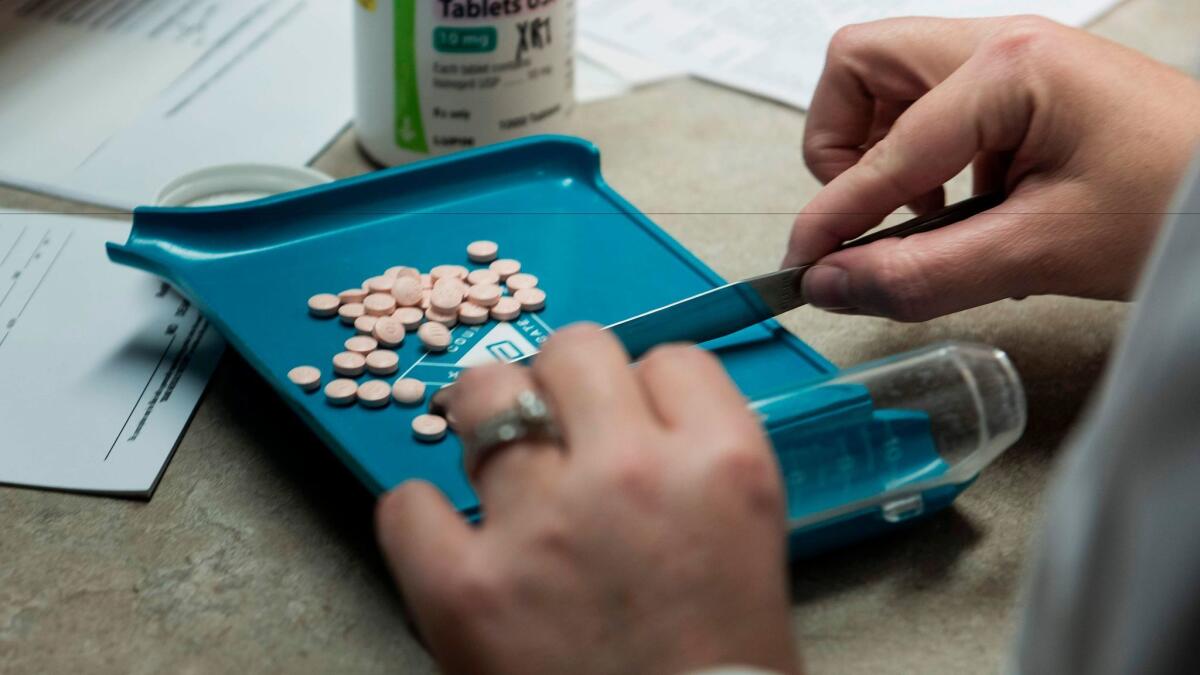Where are all the medicines for treating dementia?

- Share via
There is no cure for common forms of dementia, such as Alzheimer’s disease. Doctors don’t even have a way to slow it down. What they do have are a handful of drugs that can help, a bit, with symptoms.
Why so few options? Alzheimer’s and other dementias are complex conditions, and scientists still aren’t certain what key problems in the brain need to be corrected to make a difference for patients.
Another issue is timing. By the time a patient notices he or she has trouble thinking, visits a doctor and gets a diagnosis, the underlying cause of Alzheimer’s has been building for a decade or more. That means it’s probably far too late to fix the damage.
“It’s like hosing down the building that has already been burnt,” says Dr. Paul Aisen, director of the Alzheimer’s Therapeutic Research Institute of USC’s Keck School of Medicine in San Diego. “That game is already lost.”
The drugs approved to treat symptoms work by helping brain cells communicate better — they boost the action of chemical “messengers” that transmit signals from neuron to neuron. Though these medicines have been tested mostly for Alzheimer’s, doctors may also prescribe them for other types of dementia.
The first class of drugs assists a chemical in the brain called acetylcholine; drugs in this class are donepezil (Aricept), rivastigmine (Exelon) and galantamine (Razadyne). The other class works on a different messenger, called glutamate. There’s only one drug in this class, memantine (Namenda).
The medications may help a bit with thinking and memory, but the results vary among patients, and may not be that big, says Dr. Claudia Kawas, a neurologist at UC Irvine. Still, they can make a difference. If family members start noticing that a person remembers conversations better, she’d call that a “great” result.
Scientists also hope that treating people at risk for dementia early — well before they have any trouble with memory or learning — could one day help protect the brain. To test this, they’ve started several clinical studies to treat Alzheimer’s before the slightest sign of any problem.
They find people at risk for future Alzheimer’s using brain scans and spinal taps to detect amyloid-beta, a chemical that many scientists suspect is responsible for kicking off the dementia process. One large study, the worldwide Anti-Amyloid treatment in Asymptomatic Alzheimer’s (A4) trial, plans to test a treatment that interferes with amyloid-beta in 1,150 people who have too much of the stuff.
Researchers are also running early studies of drugs that attack other parts of dementia biology, such as the immune system or the tangled blobs of a chemical called tau that build up inside brain cells.
Given the complexity of dementia, and the fact that many people have more than one kind, Kawas suspects the ultimate answer may be not one drug, but several. In fact, doctors can already prescribe a combo donepezil-memantine pill (Namzaric).
“We’ll need a cocktail,” Kawas predicts.
MORE
Why exercise is the best medicine for your brain
Is this normal forgetfulness or should I be worried about Alzheimer’s?
How to help a loved one cope with dementia






